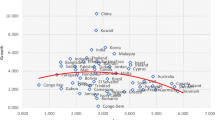Abstract
While Schumpeter’s broad theory of how capitalist economies worked articulated in his Theory of Economic Development received strong attention in his lifetime, it was neoclassical economic theory that took hold of the profession in the last half of the twentieth century, and today few economists even read Schumpeter. The first part of this essay considers the reasons why Schumpeter largely has been ignored. However, recent developments have increased the interests of economists in innovation and in innovation driven economic activity, and the time now may be ripe for a renaissance of Schumpeterian economics. The second part of this essay provides a sketch of what an economics text-book, written from a Schumpeterian perspective, might look like.
Similar content being viewed by others
Notes
He provides the basis for one much later, in Chapter 7 of his Capitalism, Socialism, and Democracy.
The most influential such study of is Solow’s (1957). However. Solow’s work was preceeded by several other studies that came to a similar conclusion on the basis of methodologies that, while not the same as his, were similar.
Salter (1966) was one of the first economists documenting the tightness of the relationship at an industry level between increases in productivity (and implicitly decreases in unit costs) and declines in prices.
For a review and discussion see Nelson (1998).
See Malerba et al. (2012), Innovation and the evolution of industries: history friendly models, unpublished, for a broad review.
For a start on such an analysis see Nelson and Consoli (2010).
References
Andersen ES (2011) Joseph A. Schumpeter. Palgrave-Macmillan, Chippenham
Chandler A (1962) Strategy and structure. MIT Press, Cambridge
Chandler A (1990) Scale and scope. Harvard University Press, Cambridge
Cyert R, March J (1963) A behavioral theory of the firm. Prentice Hall, Englewood Cliffs
Dopfer K (ed) (2005) The evolutionary foundations of economics. Cambridge University Press, Cambridge
Dosi G, Nelson R (2010) Technical change and industrial dynamics as evolutionary processes. In: Hall B, Rosenberg N (eds) Economics of innovation. North Holland Handbooks in Economics, Amsterdam
Dosi G, Nelson RR, Winter S (eds) (2000) The nature and dynamics of organizational capabilities. Oxford University Press, Oxford
Friedman M (1953) The methodology of positive economics. In: Essays in positive economics. University of Chicago Press, Chicago
Giere R (1988) Explaining science. University Chicago Press, Chicago
Kitcher P (2003) Darwin’s achievement. In: In Mendel’s mirror. Oxford University Press, Oxford
March J, Simon H (1958) Organizations. Wiley, New York
McCraw T (2007) Prophet of innovation: Joseph Schumpeter and creative destruction. Harvard University Press, Cambridge
Minsky H (1976) John Maynard Keynes. McGraw Hill, New York
Nelson R R (1998) The agenda for growth theory: a different point of view. Cambr J Econ 22(4):497–520
Nelson RR (2003) On the uneven evolution of human know-how. Res Policy 32:900–922
Nelson RR (2012a) Some features of research by economists on technological change foreshadowed by the rate and direction of inventive activity. In: Lerner J, Stern S (eds) The rate and direction of inventive activity revisited. University of Chicago Press for the NBER, Chicago
Nelson RR (2012b) Demand and supply and their interaction on markets as seen from the perspective of evolutionary economic theory. J Evol Econ 22. doi:10.1007/s00191-012-0274-4
Nelson RR, Consoli D (2010) An evolutionary theory of household consumption behavior. J Evol Econ 20:665–688
Nelson RR, Sampat B (2001) Making sense of institutions as a factor shaping economic performance. J Econ Behav Organ 44:31–54
Nelson RR, Winter S (1982) An evolutionary theory of economic change. Harvard University Press, Cambridge
Salter WEG (1966) Productivity and technical change. Cambridge University Press, Cambridge
Samuelson P (1981) Schumpeter as an economic theorist. In: Frisch H (ed) Schumpeterian economics. Praeger, New York
Schumpeter J (1934) The theory of economic development. Harvard University Press, Cambridge
Schumpeter J (1939) Business cycles: a theoretical historical and statistical analysis of the capitalist process. McGraw Hill, New York
Schumpeter J (1950) Capitalism, socialism, and democracy. Harper, New York
Simon H (1957) Models of Man. Wiley, New York
Solow R (1957) Technical change and the aggregate production function. Rev Econ Stat 39:312–320
Swedberg R (1991) Joseph A. Schumpeter: his life and works. Polity Press, Cambridge
Teece D (2009) Dynamic capabilities and strategic management. Oxford University Press, Oxford
Winter S (2006) Towards a Schumpeterian theory of the firm. Ind Corp Change 15:125–141
Author information
Authors and Affiliations
Corresponding author
Additional information
The basic themes in this paper were first presented at the conference in Vienna in October 2011 commemorating the 100th anniversary of the first publication of Schumpeter’s great book The Theory of Economic Development.
Rights and permissions
About this article
Cite this article
Nelson, R.R. Why Schumpeter has had so little influence on today’s main line economics, and why this may be changing. J Evol Econ 22, 901–916 (2012). https://doi.org/10.1007/s00191-012-0296-y
Published:
Issue Date:
DOI: https://doi.org/10.1007/s00191-012-0296-y




